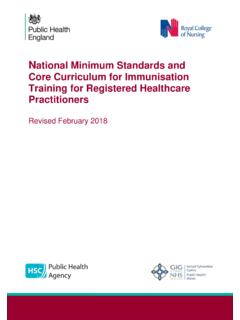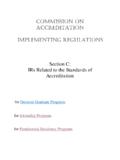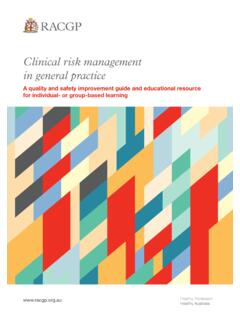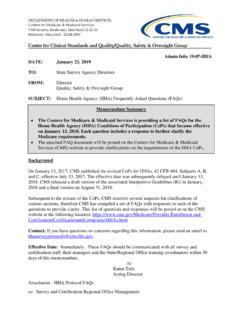Transcription of COMPETENCIES - NAPRA
1 Professional COMPETENCIES for Canadian at Entry to Practice PHARMACY TECHNICIANS Professional COMPETENCIES for Canadian Pharmacy Technicians at Entry to Practice Approved by the National Association of Pharmacy Regulatory Authorities ( NAPRA ) Board of Directors November 2013, published March 2014. National Association of Pharmacy Regulatory Authorities, 2014. All rights reserved. No part of this document may be reproduced in any form by any photographic, electronic, mechanical or other means, or used in any information storage and retrieval system, without the written permission of the author. The National Association of Pharmacy Regulatory Authorities ( NAPRA ) 220 Laurier Avenue West, Suite 750, Ottawa, ON K1P 5Z9 E-mail: | Telephone: (613) 569-9658 | Fax (613) 569-9659 1 ii Professional COMPETENCIES for Canadian Pharmacy Technicians at Entry to Practice Table of Contents Page Introduction.
2 1 Background .. 1 1 Professional Practice .. 2 Overarching concepts .. 4 Glossary .. 5 competency Categories .. 7 COMPETENCIES .. 8 Ethical, Legal and Professional Responsibilities .. 8 Patient Care .. 10 Product Distribution .. 12 Practice Setting .. 14 Health Promotion .. 16 Knowledge and Research Application .. 17 Communication and 18 Intra and Inter-Professional Collaboration .. 19 Quality and Safety .. 20 22 1 Introduction Background The National Association of Pharmacy Regulatory Authorities ( NAPRA ) is a not-for-profit organization established in 1995 and represents all provincial and territorial pharmacy licensing authorities whose mandate is the protection of the public. NAPRA s membership also extends beyond traditional geographic borders to include the Canadian Forces Pharmacy Services.
3 One of the fundamental goals of the organization is to enable members to take a national approach in addressing common issues. This document describes the entry-to-practice competency requirements for pharmacy technicians across Canada. It is a foundational document that enables a national approach to the formalization of the pharmacy technician profession and facilitates labour mobility. The document on professional COMPETENCIES at entry to practice exists to guide the development of educational outcomes, educational program accreditation standards and national competency assessment examinations. As a secondary goal, this document also provides pharmacy technician students, pharmacy technicians and the public with information on the expected COMPETENCIES of a pharmacy technician at entry to practice.
4 A regular review of the professional COMPETENCIES for pharmacy technicians at entry to practice is essential in supporting optimal regulatory practices across Canada in order to enhance patient care and public protection. Due to the significant changes to the pharmacy technician profession currently underway across the country, it was determined that the entry-to-practice COMPETENCIES should be updated at this time. This document was developed concurrently with the document on COMPETENCIES for pharmacists at entry to practice. Both documents were reviewed in parallel with a view of updating the COMPETENCIES where necessary to better support the role of both health professionals and to ensure that the terminology in both documents is appropriate and consistent.
5 The project was undertaken with the generous support of funding from Employment and Social Development Canada (previously known as Human Resource and Skills Development Canada (HRSDC)). COMPETENCIES are often described as significant job related knowledge, skills, abilities, attitudes and judgments required for competent performance by members of a profession (xv). They provide an overview of what a pharmacy technician at entry to practice is able to do rather than how a pharmacy technician is expected to perform tasks. Detailed information on how to perform tasks is normally found in the standards of practice. At the national level, the expected standards of practice can be found in the most recent version of the Model Standards of Practice for Canadian Pharmacy Technicians.
6 This document outlines the COMPETENCIES required of pharmacy technicians at entry to practice in Canada, keeping in mind changes expected in the next few years due to the ongoing progression of the profession. It is expected that as pharmacy technicians progress through the various stages of their career, these COMPETENCIES will be further developed and new ones gained. Approach The document on professional COMPETENCIES for pharmacy technicians at entry to practice was first prepared in 2007. This is the second version of the document, which takes into consideration the evolution of the profession across the country. A specific approach was adopted to undertake the review of this document. NAPRA s National Advisory Committee on Pharmacy Practice (NACPP) was assigned the task of steering the review.
7 Professional COMPETENCIES for Canadian Pharmacy Technicians at Entry to Practice With the support of a consulting firm, the first step in the review consisted of conducting a scan of current practices in competency profile development as well as a review of emerging trends for the profession. Both Canadian and international competency and standards profiles for pharmacists (12), pharmacy technicians (4) and other health professions (17) were reviewed. Results suggested that NAPRA s existing document on professional COMPETENCIES at entry to practice was already well-aligned with other national and international competency profiles in terms of the language, structure and categories used to describe practice. The emerging trends identified suggested a need for the document to better reflect the shift in practice toward the pharmacy technician providing more assistance to the pharmacist in areas other than drug distribution, such as history taking and information gathering, so that the pharmacist can more effectively provide clinical , patient-focused services.
8 These trends were confirmed with a group of individuals from a variety of pharmacy organizations during two (2) focus groups sessions. An evaluation of the types of competency frameworks used to describe the competency categories, units and elements was also conducted. Results suggested that the current function-based framework with some elements of a client-based framework was accepted by most stakeholders and worked well for a more task oriented profession such as pharmacy technicians. This information, coupled with the fact that members felt strongly that the same framework should be kept for both professions, led NACPP to support a function-based framework with some elements of a client-based framework for this review of both the pharmacy technician and pharmacist COMPETENCIES .
9 The emerging trends identified then served, among other things, to enrich the discussion during a three (3) day workshop attended by a wide range of pharmacy organizations, as well as practicing pharmacy technicians and pharmacists from across the country. A revised document was produced in response to the workshop, and then amended based on the results of both internal and external consultations with a wide range of pharmacy technician stakeholders, including those most likely to use the document: educators and examiners. The final document was approved by the NAPRA Board of Directors on November 2, 2013. It is NAPRA s intent that the document be reviewed on a cyclical basis, approximately every five (5) years. Although a function-based framework was maintained, the terminology used to denote the competency units and elements has changed.
10 In this document, competency units are now referred to as key COMPETENCIES and competency elements are now referred to as enabling COMPETENCIES . Enabling COMPETENCIES are the sub elements to the key COMPETENCIES . Professional Practice The pharmacy technician profession has changed significantly in recent years. The regulation of pharmacy technicians in certain provinces led to an expanded scope of practice in those jurisdictions, and these trends are expected to continue in the next few years in other parts of the country. Pharmacy technicians use their knowledge and skills to undertake their expanded scope of practice which allows activities such as transcribing verbal orders, transferring prescriptions, and checking the technical aspects of a prescription.









